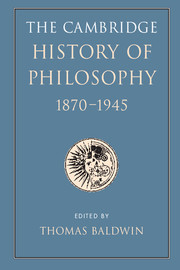Book contents
- Frontmatter
- Contents
- List of contributors
- Introduction
- I 1870–1914
- II 1914–1945
- 8 Logic and philosophy: the analytic programme
- 9 The diversity of philosophy
- 10 Knowledge, language, and the end of metaphysics
- 11 Philosophy and the exact sciences
- 12 Mind and its place in nature
- 13 Philosophy and social science
- 14 Ethics, religion, and the arts
- 15 Law and politics
- 62 Hans Kelsen and normative legal positivism
- 63 The liberal democratic state: defences and developments
- 64 The liberal democratic state: critics
- Biobibliographical appendix
- Bibliography
- INDEX
- References
63 - The liberal democratic state: defences and developments
from 15 - Law and politics
Published online by Cambridge University Press: 28 March 2008
- Frontmatter
- Contents
- List of contributors
- Introduction
- I 1870–1914
- II 1914–1945
- 8 Logic and philosophy: the analytic programme
- 9 The diversity of philosophy
- 10 Knowledge, language, and the end of metaphysics
- 11 Philosophy and the exact sciences
- 12 Mind and its place in nature
- 13 Philosophy and social science
- 14 Ethics, religion, and the arts
- 15 Law and politics
- 62 Hans Kelsen and normative legal positivism
- 63 The liberal democratic state: defences and developments
- 64 The liberal democratic state: critics
- Biobibliographical appendix
- Bibliography
- INDEX
- References
Summary
The allies portrayed their defeat of Germany in 1918 as the triumph of liberal democracy over authoritarianism, a victory marked by the establishment of the League of Nations and the creation of the Weimar Republic. However, the Russian Revolution, the rise of fascism and the economic depression of the 1930s almost immediately placed liberal democrats on the defensive. Critics argued that mass democracy and the spread of bureaucracy within both the private and public sectors had rendered the liberal ethic of the autonomous individual an anachronism. The corporate manager had replaced the entrepreneur within the economy, and the manipulation of popular opinion by the media and party machines had supplanted rational debate between disinterested individuals in politics. Individual identity and will were shaped by functional, ethnic and cultural group membership rather than innate preferences and capabilities, the exercise of reason, or effort. New social and economic conditions required novel forms of political and industrial organisation that combined decisive and expert leadership with efficient administration, thereby harnessing popular support and energy to the collective good in a manner supposedly unavailable to liberals. The economic crisis was taken as confirming this diagnosis of liberal democracy’s malaise.
The challenge to liberal democracy was threefold, therefore, involving an attack on the contemporary relevance of the market, representative democracy, and the values underlying them. In their various defences against such criticisms, the divisions amongst liberals were often as sharp as (and frequently mirrored) those between them and their opponents. Like the pre-war debates, disagreement centred on the role and nature of the state, the legitimacy and efficacy of its interventions in social life, and the parts played by democracy and leadership within its operations.
- Type
- Chapter
- Information
- The Cambridge History of Philosophy 1870–1945 , pp. 744 - 754Publisher: Cambridge University PressPrint publication year: 2003

